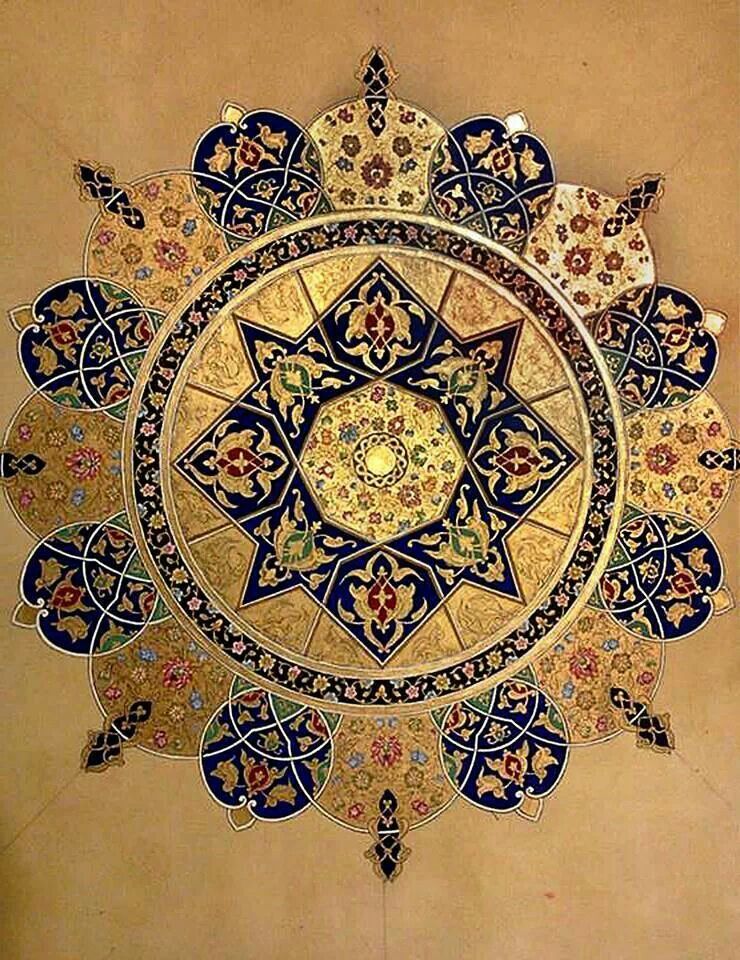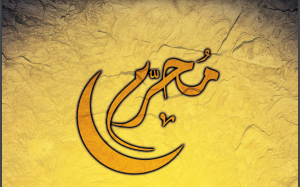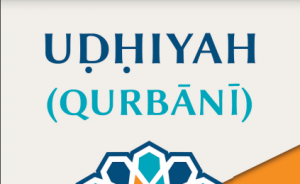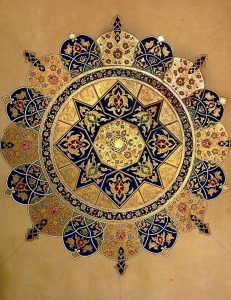By Shaykhul-Hadīth, Hadrat Mawlānā Muhammad Saleem Dhorat dāmat barakātuhum
During the months following Ramadān, Muslims around the world remember the life of the great Prophet and Friend of Allāh ta‘ālā, Sayyidunā Ibrāhīm ‘alayhis salām. A life full of sacrifice and submission to the Will of Allāh ta‘ālā.
At a very young age, when in need of the support of his father, Sayyidunā Ibrāhīm ‘alayhis salām had to leave him. Then in his old age, when in need of the support of his young son, he was commanded by Allāh ta‘ālā to sacrifice him. Without hesitation, he was ready to submit to the Will of his Creator. Allāh ta‘ālā says:
Thereafter, when he (his son) reached an age in which he was able to work with him, he said: ‘O my dear son, I have seen in a dream that I am slaughtering you, so consider what is your view?’ He said: ‘O my dear father! Do what you are commanded. Allāh willing, you will find me among the patient ones.’
So when they both submitted (to the Will of Allāh ta‘ālā), and he laid him down on his forehead, and We called out to him: ‘O Ibrāhīm! You have indeed fulfilled the dream.’ Surely, this is how we reward those who do good. This was definitely a decisive test. (37:102-106)
Allāh ta‘ālā granted this action of Sayyidunā Ibrāhīm ‘alayhis salām so much acceptance that He made the udhiyah a symbol of this great act. When asked by the Sahābah radhiyallāhu ‘anhum what udhiyah is, Rasūlullāh sallallāhu ‘alayhi wasallam replied:
It is the sunnah of your father Ibrāhīm. (Ahmad)
The act of udhiyah carries enormous rewards and the Pleasure of our Rabb. Nabī sallallāhu ‘alayhi wasallam said:
The son of Ādam does no deed on the day of udhiyah dearer to Allāh than the sacrificing of animals. It (the sacrificed animal) will come on the Day of Qiyāmah with its horns, its hair and its hooves (to be weighed). The sacrifice is accepted by Allāh before the blood reaches the ground. Therefore, sacrifice with a happy heart. (At-Tirmidhī)
Once, the Sahābah radhiyallāhu ‘anhum asked Rasūlullāh sallallāhu ‘alayhi wasallam regarding the benefits of udhiyah. He answered: ‘A reward for every hair.’
They asked: ‘And wool, O Rasūlullāh?’
He said: ‘A reward for every fibre of the wool.’ (Ahmad)
Therefore, everyone who is able to offer udhiyah should do so and acquire the rewards promised in the Ahādīth.
Who is Required to do Udhiyah?
Udhiyah is wājib upon every Muslim of sound mind, who is mature and muqīm, i.e. a person not regarded as a traveller by the Dīn, and who during any of the days of udhiyah (10th, 11th and 12th Dhul-Hijjah) possesses wealth in any form, be it gold, silver, cash, merchandise etc., which is surplus to his basic needs and equal to the amount that makes zakāh obligatory i.e. nisāb (being 612.36 grams of silver or its equivalent in cash). One should note that it is not necessary for this amount of wealth to be in one’s possession for an entire lunar year. The obligation of udhiyah is established simply if wealth equivalent to the threshold for zakāh is possessed during these specified days.
Some Misconceptions Regarding Udhiyah
Here, I would like to clarify some common misconceptions regarding this ‘ibādah.
1. One common misconception regarding udhiyah is that it is merely a virtuous deed; it brings reward to the one who performs it and there is no blame or sin if it is not done. This is a serious misunderstanding. Udhiyah is likely to be wājib upon most people in the UK.
2. The second misunderstanding is assuming that the obligation of udhiyah is shared between the entire household. This results in those members of the household upon whom udhiyah is incumbent performing just one between them, feeling that the obligation has been fulfilled. This is not so. If a man possesses the nisāb of zakāh, one udhiyah is wājib upon him. If his wife also possesses the nisāb, she will have to perform a separate udhiyah. Similarly, if any of the children meet the requirements of wājib udhiyah, it will be compulsory on each one of them as well.
3. Another common misconception is that udhiyah is carried out to allow people to eat meat that is considered blessed. With this in mind, they are satisfied with eating udhiyah meat that has reached them from others and do not feel it necessary to perform their own udhiyah. There is no doubt that udhiyah meat is blessed, as udhiyah is the re-enactment of the sacrifice made by Sayyidunā Ibrāhīm ‘alayhis salām, the friend of Allāh ta‘ālā, but more importantly it is an obligation that must be fulfilled. Such people should worry about discharging the obligation of udhiyah and not merely be content with partaking of its blessed meat.
4. In many households, the father performs udhiyah on behalf of all his family members without their knowledge or without their explicit or indicative consent for him to do so. We should understand that without such knowledge and consent, any udhiyah performed on behalf of someone else will only amount to a nafl udhiyah. Therefore, in the case of a father arranging the udhiyah for his dependants, the dependants should make him their wakīl (agent) in order for these sacrifices to fulfil the obligation of udhiyah upon them.
It is clear from the above that we must familiarise ourselves with the masā’il and injunctions of udhiyah. These masā’il can be learnt from various books as well as through consulting the ‘Ulamā and Muftīs.
The Spirit of Sacrifice in Udhiyah
Just as the name itself suggests, udhiyah should be carried out taking its literal meaning into consideration. Generally, we arrange for our qurbānī to be carried out at a cheap price in a poor country. No doubt this fulfils the obligation, but it is not the type of qurbānī that Allāh ta‘ālā would like to see. We will not experience the spirit of udhiyah until we carry out the obligation by sacrificing a sheep in our own country, which is often equivalent to, or even more than, sacrificing a cow elsewhere. Allāh ta‘ālā has provided for us in abundance so we should express our shukr (gratitude) to Allāh ta‘ālā and not be miserly.
So by all means, we should offer an udhiyah in needy countries, but we should also offer one in our own locality. By doing so, we too can better experience the spirit of udhiyah.
The Custom of Our Pious Predecessors
During the three days of udhiyah, Shaykhul-Hadīth Hadrat Shaykh Mawlānā Muhammad Zakariyyā rahimahullāh used to consume only the udhiyah meat and would not consume any other food items with it. The Shaykh would say that during these days we are the guests of Allāh ta‘ālā and that the meat of udhiyah is His Hospitality. We can gather from this how much importance our pious predecessors gave to qurbānī.
In addition to performing the wājib udhiyah, a person should endeavour to perform as many nafl udhiyahs as possible. We should offer udhiyah on behalf of Rasūlullāh sallallāhu ‘alayhi wasallam, our parents, our teachers, our Mashāyikh, our well-wishers and benefactors, and also one on behalf of the whole Ummah. We may also perform udhiyah on behalf of the various Sahābah radhiyallāhu ‘anhum, alternating between them on different occasions. The same applies for the awliyā (friends of Allāh ta‘ālā), the Muhaddithīn and the a’immah, all of whom we are indebted to.
My honourable father, Hāfiz Ibrāhīm Dhorāt rahimahullāh, used to keep an annual record of nafl udhiyahs performed on behalf of all these great personalities. He also used to perform nafl udhiyah every year on behalf of his parents and his Shaykh.
In this manner, our intended reward will reach the pious in the Hereafter and, inshā’allāh, will be a reason for them to search for us on the Day of Judgement. We should also make this practice a habit whenever we have the opportunity to spend in the Path of Allāh ta‘ālā. These acts will prove spiritually beneficial for our lives in this world and the Hereafter.
May Allāh ta‘ālā give us the ability to offer udhiyah in its true spirit, not feeling it a burden, but with zeal and eagerness. Āmīn.
Taken from ‘Inspirations’ (Volume 1) published by Islāmic Da’wah Academy
© Islāmic Da’wah Academy
Read Further : https://as-suffahacademy.org/udhiyah-qurbani







